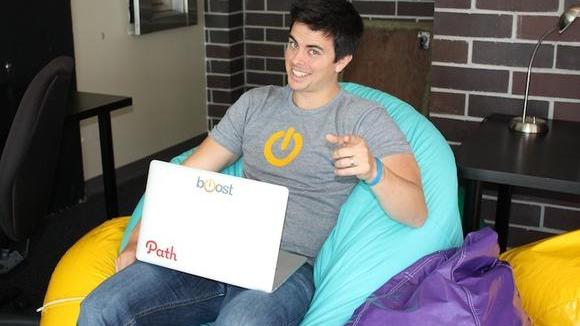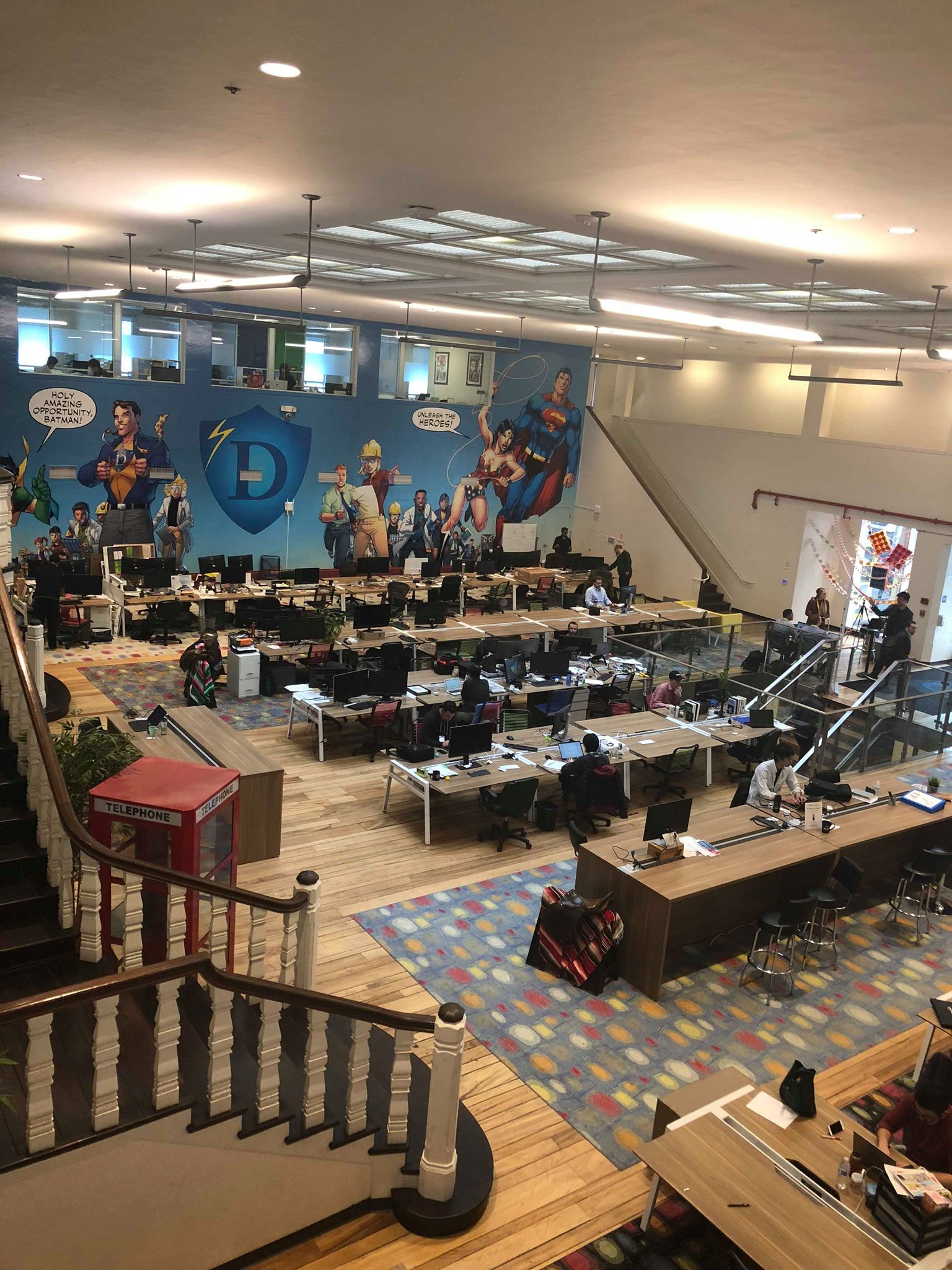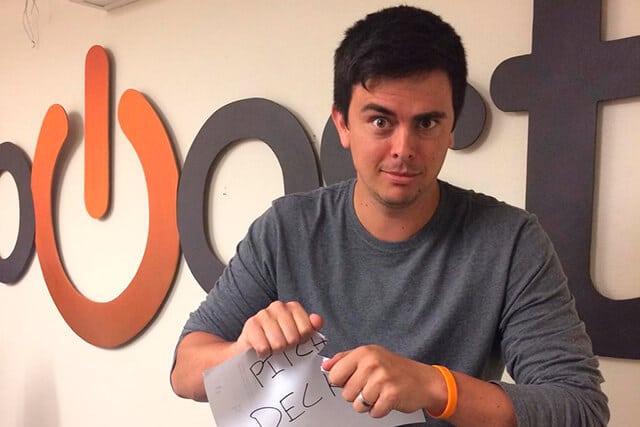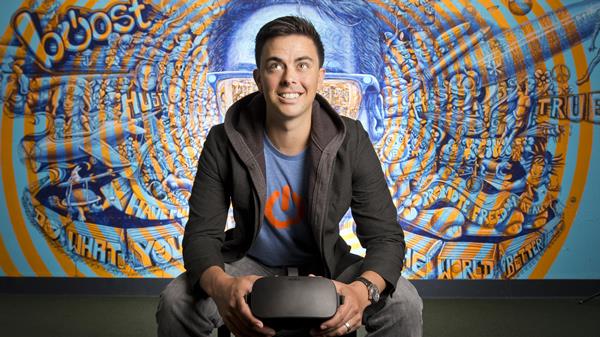
Boost VC’s Adam Draper on Blockchain as a Startup Superpower
Adam Draper is the founder and managing director of Boost VC, an accelerator that focuses on exploring the applications of VR/AR, blockchain, cryptocurrency, bots, space, artificial intelligence, and drones. Boost VC is more than just a series of buzzwords, as the accelerator has funded over 200+ companies and launched some really cool projects. A fourth-generation VC, Adam Draper invested and backed startups such as Coinbase, Plangrid, Amplitude, as well as many more through Boost VC.
Located in San Mateo in Hero City, Boost VC plays an integral role within the Draper University ecosystem, a world energized by the ambitious and eccentric father/son duo of Tim and Adam Draper.
All it takes is a quick one-on-one conversation with Adam to get a feel for his passion for the startup community and exploring technologies that could potentially solve problems and enhance life for all of mankind.
The following interview was conducted at the DraperU 2018 Blockchain Intensive and goes over blockchain and its role in the growth of the entrepreneurial tech-world.
It’s really cool seeing how DraperU and Boost VC are really embracing multiple technologies like blockchain, VR/AR, AI, etc all on one block.
Yeah, I guess it is sort of interesting for people. Until you’re here, you don’t really see it. It’s really interesting. Yeah, we’re all like right here. It’s been awesome. We have some crypto companies in this tribe who’ve definitely been able to benefit. VR companies learn more about crypto by being a part of all the events that are going on. One of our companies helps people put to put together the ERC20 smart contract so people were getting excited about launching their own coins.

The ground floor of Hero City.
I think blockchain is going to accelerate VR pretty substantially.
Originally, I said this during my talk, but originally, we jumped into crypto and then two years later, we jumped into VR and crypto. People were like, well, where’s the overlap? In my mind, there wasn’t even an overlap. I just thought they were both really important technology and people were going to have them.
And then recently, like in the last six/nine months, I’ve realized that VR doesn’t work without crypto and the perfect use case for the blockchain is VR. We’re realizing that there’s a whole emergence of huge potential just in that category of things, which is wild because it was lucky. I think one of the things that has given me the impression of that being really useful is Crypto Kitties honestly.
It’s underrated technology.
Very underrated and laughable.
Beanie Babies were a $3,000,000,000 industry.
Yeah. I collected comic books. I collected cards. I’m a huge collector of things but digital has never had that feeling of scarcity where it’s like there’s one in 100 of these or there’s one in a thousand of these. Which is super exciting that we can do that now and distribution is the internet. How cool is that? Like instead of distribution being the sports card store or the comic book store, the internet is able to be the distribution service.
You don’t have to risk putting a rare edition card in a letter and sending it to Pakistan and hoping the money gets to you. It’s just done.
I haven’t seen the traction for art collectibles yet, but I’m really excited about it. And there are a couple of companies that are working literally just on marketplaces like the eBay of these digital goods. I’m really excited, we actually have a company called DarkWinds that’s launching sort of a Magic the Gathering on the blockchain. And I’m really excited about the future of all these things because you can actually long term make the cards more valuable. If someone pre-programs this into the system whereas blocks are mined or blocks are used.
You could also make it so that people can only use cards a certain number of times per week. You can make it like as if in the Magic the Gathering system, but you can also make it so that they become more powerful as you play. So, if you play more, the cards become more powerful. I think that’s so cool. This is such a fascinating concept that couldn’t have existed with flat cards. Suddenly, there’s a truth in the blockchain of transparency that can allow for that. When our company said we’re launching this, it’s sort of like Magic the Gathering but it’s with pirates, I bought a bunch of cards because I got to play.
Especially if it’s peer to peer dueling sort of thing. As long as it works, and you retain your card value.
Have you seen Ready Player One yet? He goes through the store and grabs the bombs and whatever. That isn’t possible without the blockchain, like having one bomb is not like a possible thing without the blockchain. It’s wild.
Great movie. The inflection point of the technological curve is we’ve got AI, we’ve got VR/AR and blockchain and they all sort of cross-pollinate. Then robotics mixed in there too. All four of them are experiencing massive amounts of rapid growth. Just to see it go down is just like, damn.
Another thing that I’m seeing is the AI characters are going to be a thing in VR. So, there’s overlap of all these is what you’re saying. The overlap of all three is going to be fascinating. It’s going to get to the point where you can interact with animals, characters and stuff who will talk and talk back as well. There are going to be millions of these AI’s out there. Like someone said to me, I love the thought process. There’s going to be 10,000 AI’s per person. The idea that there’s just going to be an infinite number of these personalities, this intelligence out there in software is so cool and you’re going to interact with them through virtual reality. I’m a VR first person, I think VR is going to take off before AR.

Think about this. If an AI is just so good at understanding the human brain, how humans interact and how they de-stress and stuff, you can literally do therapy in VR without talking to another human being. There’s an AI here helping. But in VR, you can put that in everybody’s home and make a big leap in solving a global mental health issue.
And without pills. We have one that’s for Alzheimer’s. Reversing Alzheimer’s is their goal. You’d actually be in control of reversing. There’s a lot of studies that show that music, exercise, and experience are all very helpful in reminding the brain about who you are. Alzheimer’s patients will go through this product. It’s really interesting. It’s on a bike, you’re biking through this forest area. There’s music that’s playing in the background that’s from your childhood and it’s really captivating. That’s exciting. The medical use cases that aren’t medical. The ones for mental health or for brain health which is the whole category.
Any sort of isolation can be cured through that as well. Like astronauts in space. I don’t even know how they do it. Spending like six to eight months interacting with only three people. VR puts them down here.
Six months in space, VR would solve that completely.
You’d be able to chill with your friends and family anytime you want to.
Someone’s got to send a VR headset up to space. Put the first VR headset on the space station. Let them play with it.
Exactly, or stream them down to their family.
When’s the next space thing going up? Can you just look up these things on the internet? Let me follow this thing. Space, that’s another thing that’s intersecting with all these technologies.
It was science fiction before but now it’s blending into reality. When I was growing up, the idea of being able to video chat with somebody was insane to me. I was like, THAT is a future. And that was commercially popular in just a few years.
The thing that showed me the power of technology was actually Napster, peer-to-peer file sharing. I think it was the true power of networked computing where someone had music on their computer and I was able to see it and then I was able to bring it into my computer and I was able to listen. That asset-based sharing thing blew my mind and I was obsessed with it for like a long time. I went through the phase of downloading things and you had to misspell to get the right downloads.
It was a really interesting phase to go through for everything. I mean, without Napster, there was no Skype. That technology needed to show itself as peer to peer technology in order to… Bitcoin. Bitcoin is just peer to peer technology. It’s a peer to peer networked system that’s hooked to a ledger.
The differentiator between today’s companies and the early Internet companies was where those companies, their growth was limited to the growth of the Internet because who was on their computer? A very little amount of people. We have fully loaded internet where 12-year-olds and eight-year-olds are on it and they understand how to use it.
They understand how to use it without ever not understanding how to use it.
Every single company coming out now has instant access to all of these things. Feedback loops can be an hour short whereas back in the day, it was just like days, weeks. It’s pretty fascinating stuff. What I like about the Blockchain Intensive is you guys are really taking ownership of blockchain as a technology and educating people into it and you guys have an amazing platform to do it.
I don’t think we realize how great of a platform it is. This was a shot at seeing how impactful we can be. I will say I’m not affiliated technically with the event other than genetics with my dad, but we’re geographically in the same location. So, I help just by talking, speaking. I didn’t set it up though, that was all my dad and his team. He has a great team. We’ve gone big on crypto and we’ve been doing for a while now. I was technically the first Bitcoin fund. It wasn’t called crypto. It was just called Bitcoin. Then I got obsessed and then he got obsessed and then he got the Marshall coin and we just went. Now, the world has gone crazy with crypto. I was in Singapore three weeks ago and it’s just all anyone could talk about.

No matter what your intelligence level is or what you’re doing in life, if you just heard about crypto, which most people did mid-2017, you’re tasked with this enormous burden of learning blockchain theory and everything that has to go into it in such a short period of time to be able to make an educated investment in coins that are going up, regardless of whether they’re a good investment or not. It was just such a little wacky…
Now, I think that like a big piece of last year was about education. So, you guys do the service but supplying as much content. But those people who didn’t really understand it but were playing had to learn over a course of time exactly how everything worked. So, that’s really exciting. It’s sort of like the Internet is common knowledge now, but when the Internet was being pitched in 1995 to 1999, it was probably an equally unfathomable thing. You connecting digitally to people makes no sense.
I always try to put myself in the mental perspective on the cusp of innovation with the general before like what people were thinking before a lightbulb turned on. What is this thing? What implications does this have? Now, we can work at night.
Do we have more time now to do things? That’s crazy.
They just won another four or five hours at their own leisure.
That’s awesome. I hadn’t thought of it like that, but I love it. So, in my head, you’re not replacing dark with light, which is definitely a huge value add. You wouldn’t be able to do what we’re doing in the basement without light. It’s a trust system. So, somehow there’s this on switch where now there is machine trust. I wonder what the next generation is going to be like? What their lightbulb flip on is. That’s going to be cool.
That’s a great way to think about it.
It’s like the cyborg merging.
I think that’s the next one. I’ve got this wacky theory that our generation, people that are relatively young now, there’s going to be a point where the ability to transfer your sentience into a machine is going to be a possibility. I don’t have a trajectory for it, I just think it’s going to happen at some point. There is going to be a significant drop-off of people that are just getting older and things happen to them and they die before that sentience uploading point. The ones that make it past that point live to infinity. The ones that don’t, don’t.
Then it’s like, what is a human? That’s basically what the question ends up being. If you had Einstein’s brain, do you have his soul? Do you have the pattern recognition that he’s created for decision making? That’s what existence is. And memories.
Lightbulbs.
Perfect.
To keep up with Adam Draper, check him out on Twitter. Boost VC invests $50k – $500k in exchange for 7% of companies and provides housing, workspaces, and a deep network in the startup world. You can learn more about Boost VC here.
The post Boost VC’s Adam Draper on Blockchain as a Startup Superpower appeared first on CoinCentral.

Coincentral.com is author of this content, TheBitcoinNews.com is is not responsible for the content of external sites.
Our Social Networks: Facebook Instagram Pinterest Reddit Telegram Twitter Youtube











